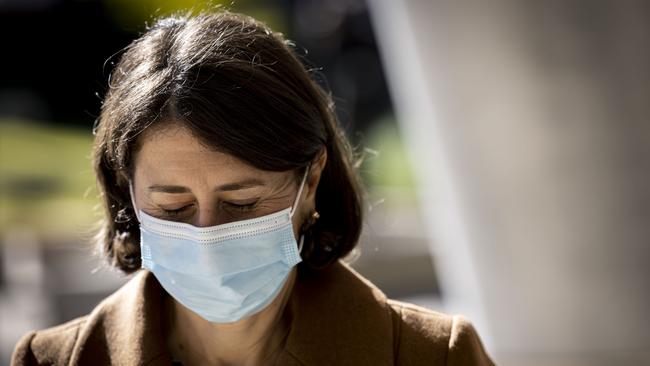
No government in Australia has been more reluctant to institute lockdowns than Gladys Berejiklian’s in NSW. It is rightly held up as the gold standard of contact tracing and managing small outbreaks.
So Berejiklian was extremely reluctant to impose lockdown. But she was right to do so, and if anything may have acted a fraction late.
Nearly 30 per cent of Australians have had one dose of the vaccine. But fewer than 7 per cent of the population have had the double dose. Delta gets through the vaccine more effectively than previous variants of the virus but a double vaccine dose seems to be pretty effective. However, people with only a single dose are more vulnerable. And people with no dose, more than 70 per cent of us, are extremely vulnerable.
There are millions of Australians who are not vaccinated at all. That means the potential for exponential spread, stress on health systems and resultant widespread death in Australia is stronger than in nations with much higher vaccination rates.
Berejiklian was saying that she’d be more confident about returning to normal when 80 per cent of her population is vaccinated. That is an extremely high vaccination rate by any standards.
But even vaccination is probably not a 100 per cent solution. Life may not return altogether to its pre-Covid state for years.
Britain, with its vastly higher vaccination rate, is still under severe restrictions. It extended lockdown for four weeks because of the infectiousness of the Delta variant. It still has thousands of Covid infections, and often dozens of deaths, each day.
Nor is the Delta variant necessarily the last word from the virus. A Delta Plus variant looks as though it is more effective at evading the natural immunity developed by those who have had Covid and recovered.
There are two separate types of lockdown with different epidemiological purposes. A short lockdown, two days as the Northern Territory has instituted or the more common three days, is designed to let contact tracers “catch up” with the virus’ spread, track all the contacts down and isolate them before the virus gets out of hand. A two-week lockdown is designed to stop the spread of the virus altogether.
More general restrictions, like those now in Perth, are just social distancing designed to make the spread of the virus more difficult.
Although the medical treatment of Covid infections has improved greatly, the majority of Australians who are unvaccinated face the same dangers from the virus as they did a year ago. But the Delta spread is radically more rapid than the virus was then.
Not only that, everything we learn about so-called long Covid, the illness and symptoms which so many people suffer long after they’ve recovered from Covid, is increasingly disturbing.
Australia’s vaccine rollout has been slow, but it has been dogged by genuine bad luck in the Astra Zeneca blood clots complication which affects a vanishingly tiny number of people but has dented confidence, and in the early Queensland University vaccine proving to be a non-goer. We also should have moved more quickly to dedicated safe quarantine facilities for people from the highest risk countries.
Nonetheless, despite our discontents, overall Australia has done magnificently well in preserving human life and it’s clear that the vast majority of people want that to be the priority.
It is wrong to criticise the Morrison government for not having a clear road map out of the virus. No one knows what the virus itself will do in terms of mutations and infectiousness.
The next big change point comes when we are 70 or 80 per cent fully vaccinated. That’s many months away. After that we’ll need annual booster shots. The desire for this virus to be in the past is understandable. But there’s no sign the virus is willing to go along with that wish.




Australia almost certainly faces episodic, rolling lockdowns and acute restrictions on normal life at least until Christmas. This is the inevitable consequence of the infectiousness of the Delta variant of Covid and the still-low vaccination rate in Australia. Actions all over Australia demonstrate the truth of this.